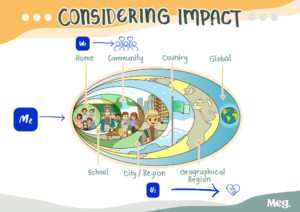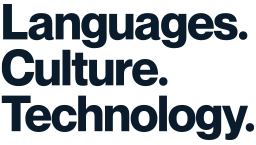Inclusion of All Cultures at Mernda Primary – Student Ambassador Case Study
“Start little, grow big!”
– Matthew, Grade 5 Mernda Global Citizenship Student Ambassador
Mernda Primary School is a Foundation to Year 6 Primary School, located in Melbourne, Victoria, Australia. With a diverse make up of 50+ cultures and languages, a strong EAL background (43% of students speaking a language other than English as their first language) and driven by its values of RESPECT (Responsibility, Excellence, Success, Pride, Empathy, Courage, Trust), the Global Citizenship Student Ambassadors early on identified that they wanted to focus on an issue linked to schools cultural make up and the need for an increased cultural awareness of all cultures, not just the dominant ones. After much brainstorming of ways to address this, they decided they wanted to take advantage of the schools newly created ‘Maker Space’ prefabs, choosing to host and produce a podcast series, with a different culture highlighted each episode with student and staff guests.
The Going Global Student Ambassador Program at Mernda Primary consists of two Year 5 students and two Year 6 students. These students all shared a common interest in wanting to create positive change in our school, and a shared passion for learning new things. They chose to have Year 5 representatives so they could both build and maintain capacity of these Changemaker skills, with the Year 5’s moving into Year 6’s in 2023. They wanted to learn what it means to be a global citizen, what this means for students their age right now in the world, and the impact they can have through even the smallest change. They were excited to join Meg’s Global Citizenship Ambassador Program to have a peer program to develop and explore all these areas and skills.
Project description
Problem identified: A need for increased cultural awareness. Aiming to bring more understanding and representation of all cultures from our school community, not just the dominant ones. Having students recognise the cultural diversity in our school community – educating more people about these cultures.
As part of the Design Thinking process that all students worked through as part of the Global Citizenship Ambassador Program, possible solutions were brainstormed to meet this need. These included:
- Addressing stereotypes and educating further on these.
- Introducing a Multicultural Day -> further expanding on an existing Harmony Day; potentially host a Cuisine Day.
- Introducing/Increasing visual representations (signs, pictures, posters, ground decal) around the office/School entrance and areas of the school – ‘Welcome’ in the languages of our school community.
- School mural of different cultures.
- Parents and people in the community visiting/podcasting to share about their culture.
- World Expo – students research a country for a substantial amount of time (e.g. 1 semester), and then have a whole-school expo.
- Indigenous Elder visit to educate about their culture -> talk, demonstration of instruments.
- Students find other students with the same background/culture to share their traditions and customs -> dress up in cultural dress.
- School Trivia Night to fundraise (if needed for resources or a cause [i.e. refugees]).
After a period of discussion and evaluation of each idea, a final solution was decided on it’s merits of it being something the Ambassadors felt would sufficiently address the problem identified, but also was of interest to them to do and something they felt their peers and broader school community would enjoy and be able to also participate in easily. They settled on designing a podcast that interviews students and staff about their cultural identity. With over 80 cultures identified from staff and students, they have a lot of material.
“We’d really love to podcast to interview different students to find out about all the different backgrounds at our school, and to spread awareness of that so that so people more aware of peoples beliefs, the different customs, traditions that are celebrated in our school that we might not talk about regularly or get noticed as much.”
– Student Ambassador conclusion after their ideation phase.
Project Aims:
- Ensuring all students feel they are not only welcome, but embraced within our MPS community, and that their culture is something that is valued.
- Ensuring staff also feel welcome and embraced with all aspects of their culture.
- Ensuring parents/caregivers feel welcome and embraced from all cultures into our school community.
As part of the knowledge exploration on topics linked to Global Citizenship Education, the students learnt about the UN Sustainable Development Goals and identified the following goals would be addressed to their project:
- SDG 10 Reduced Inequalities.
- SDG 17 Partnerships for the Goals.
Implementing phase
Informing and educating others
Once the survey was completed, over 50 languages and cultures were identified, within the first two weeks. The first step was to inform the school community about the project and invite both feedback on it, and participation in it. Through targeted audience identification, students used a variety of strategies to reach their target audiences to inform about the project and ask people to complete the survey.
A number of ways were used to educate and inform different groups within the school and school community:
- Students and school staff: School platform ‘Firefly’, posters around the school, presentations at assembly, students visited classrooms to present project and invite participation.
- Wider school and local community including parents: School platform ‘Firefly’ and school newsletter.
“The school community loved hearing about The Student Ambassador Program as a new opportunity in the school, particularly the Year 5 and 6 students who were given the first opportunity to be involved in the project themselves – this has piqued massive interest in Changemaking and these types of projects.”
– Stef Kostic, Global Citizenship Coordinator
Involving others
Part of being a Global Citizen, is understanding and applying the ideas of GLocal (Global to Local and Local to Global) to not only understand local and global issues, but also understand how to design effective changemaking for the dynamic systems in globalised societies we live in.
Through intentional mapping of different groups using Meg’s Considering Impact Model, students were able to identify how their project both could involve others, and might impact on them.
Project outcomes
It was a good opportunity to learn leadership skills.”
– Aarya, Grade 5 Mernda Global Citizenship Ambassador
The Ambassadors had a variety of project ideas to begin with (podcasting, school mural/artworks, cultural day, cuisine day) before making their final decision to produce a podcast. Once this idea was chosen, the vision was quite clear in what it would look like. However, with the students planning a real world project, they needed to be flexible and adaptable as they implemented their project, responding to the real life challenges that came up. Using a range of problem solving, critical thinking and creativity skills, the students addressed several issues and challenges. Due to absences and school/year level commitments along the way, the timeline of when the podcast was due to begin was delayed, which posed a challenge for completing the project by the end of the year. The Ambassadors faced further challenges when there were delays on equipment ordered, further delaying their timelines to start recording. Nevertheless, Stef Kostic, expressed that the Ambassadors worked well to make do with the time they had to get everything done before the school year wrapped up.
As the project supporting educator, Stef Kostic, observed that students benefited in a number of ways:
- A definite growth in the Ambassadors’ critical thinking skills was observed, with regard to creating their project and working out the logistics of how they were going to complete it.
- Also observed was the change from four individual students with independent ideas turn into a team who collaborate and have a shared vision for success. This has been something she witnessed, as well as something certain students’ themselves have reflected on and realised.
I am honoured to have been able to implement and see the Student Ambassador Program through this year with our current Year 5 and Year 6 students. Although nervous at the beginning of not knowing what the program would entail exactly, I really enjoyed learning this alongside the student team and seeing the direction we took it in together. The Zoom meetings were such a great way to connect with students at other participating schools, and hear about the different projects being implemented. It was also a great way to discuss new concepts, such as the Sustainable Development Goals and the ripple effect!
I definitely think the program has been a huge asset in promoting critical thinking and teamwork skills among students who previously would not have worked together, and enabled them to combine their skills and strengths to achieve their shared goal.
– Stef Kostic, Global Citizenship Coordinator
Project alignment with school and state curriculum
How does this project align with school curriculum, vision, values and aims?
The Student Ambassador Program was described as “aligning perfectly” with the school vision to use engaging, purposeful and challenging programs in order to nurture a lifelong passion for learning, development of personal growth and knowledge, and strengthening the schools communities. Through the program the Student Ambassadors developed and reflected on new knowledge they obtained, the growth they made individually and in working together. They have also been able to share what they have learned with the school community, and involve other students in their project.
The Mernda Primary School values are RESPECT (Responsibility, Excellence, Success, Pride, Empathy, Courage, Trust) and the fact that every student is valued within our school. The Ambassadors’ project is based around cultural awareness, and they are actively helping to spread this knowledge and understanding through their fellow students in the school and community.
How does it align with the Victorian state curriculum?
The project met three of the four capabilities in the Victorian Curriculum F–10, all except Ethical Capability:
- Critical and Creative Thinking
- Ethical
- Intercultural
- Personal and Social
The Department of Education and Training’s Framework for Improving Student Outcomes (FISO) have two main outcomes:
- Learning is the ongoing acquisition by students of knowledge, skills and capabilities, including those defined by the Victorian Curriculum and senior secondary pathways.
- Wellbeing is the development of the capabilities necessary to thrive, contribute and respond positively to challenges and opportunities of life.
There are five core elements of FISO, with the Student Ambassadors’ project addressing two:
Leadership
- The strategic direction and deployment of resources to create shared goals and values; high expectations; and a positive, safe and orderly learning environment
- Shared development of a culture of respect and collaboration with positive and supportive relationships between students and staff at the core
Engagement
- Activation of student voice, agency, leadership and learning to strengthen students’ participation and engagement in school
- Strong relationships and active partnerships between schools and families/carers, communities, and organisations to strengthen students’ participation and engagement in school
2023 and beyond
Students identified that they hoped this is the beginning of many conversations that can be led by staff in classrooms and within the school to continue a positive change. They are hoping for the podcast to continue into next year, with the 2022 Grade 5 ambassadors graduating to Grade 6’s in 2023. The school has a new ‘maker space’ called the Creation Station with all the tech equipment they need for their podcasts, and with such a high number of cultures, there are plenty of interview subjects for next year – and beyond! For now, meet the Mernda Student Ambassadors….




